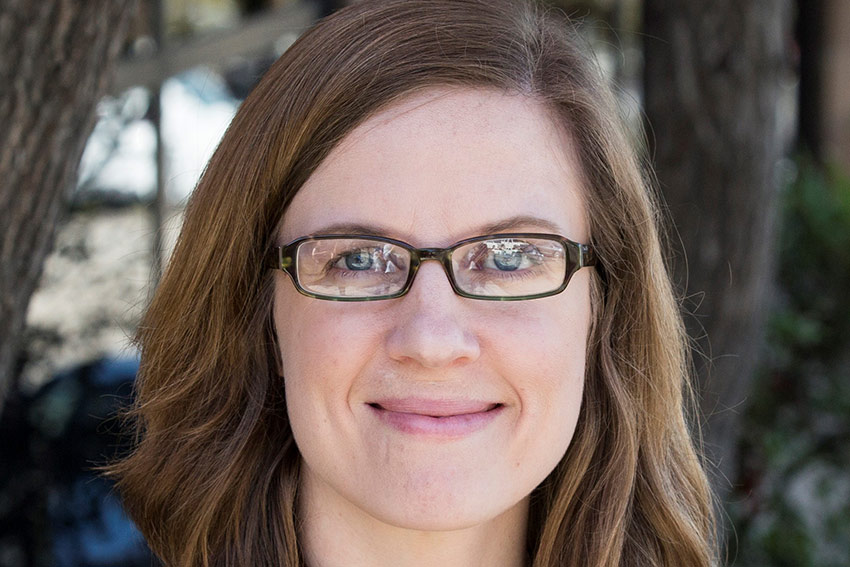18 January 2018
Science Communications Instructor Heather Buschman on Telling Great Science Stories
By David Washburn

Name: Heather Buschman
Courses: Science Writing I
Heather Buschman wanted a mission-driven career and had a head for science–so earning a Ph.D. in molecular pathology from UC San Diego School of Medicine and going to work as a bench researcher seemed like the right track for her.
But after a few years in the lab, Buschman realized it wasn’t something she could do forever and started looking for a way to stay in the world of science but put her talents to better use. She found her new niche in the world of science writing and is a senior communications manager for UC San Diego Health.
When did you first realize that science writing was the right path for you?
I really enjoy working hard and put a lot of myself in my work–but in research you can put weeks, months and even years into your work and have nothing to show for it due to no fault of your own. In science writing, I get great satisfaction by meeting shorter-term goals and I always get out as much as I put into it.
During grad school, I also found that I enjoy doing things that a lot of scientists hate–things like giving presentations and writing grants. Then I took Science Writing [through UC San Diego Extension], which I always credit with launching my career…I’m thrilled to come full circle to now be the one to teach that same class.
What do you most enjoy about being a science writer?
I really like learning about all kinds of different areas of research and being on the leading edge of what’s new. I like talking to researchers as a peer and then coming back to my desk and using my creativity to find ways to explain that science to a non-scientist.
What is most challenging aspect of the profession?
Trying to reduce hype and being as clear and accurate as possible…we want to be an antidote to this world of fake news. But at the same time, it is a challenge to attract attention given all that is out there. Our hardest work is striking a balance between getting attention and being accurate and transparent.
As far as working with outside media, I’ve been getting much more careful in vetting outlets before we set our people up with them. Things come across my desk every day from media outlets I’ve never heard of…so we have to do our due diligence to make sure [the outlet] is worth our time and somewhere we want our experts to appear.
What advice would you give someone looking to enter science communications?
First off, you don’t need a Ph.D. I’ve worked with both–people who come from a science background and those who come from the world of journalism.
These days if you want to be a science reporter for a daily newspaper, the outlook is grim. But while that area has shrunk, you have a new field that I call brand journalism–all these companies, universities, and institutions have built their own communications channels and they need qualified science writers to fill them with content. These owned communications channels are voracious monsters that need to be fed all the time.
Finally, if you come from the science background, it’s not enough to just know the science, you need writing samples that you can show people…you can’t just look at it as backup in case bench research doesn’t work out.
How is the field changing?
Just a few years ago, our office didn’t produce a newsletter, we didn’t produce as much video, and we didn’t have a podcast. We used to just have to be writers, now we have to be photographers, videographers and graphic artists. And it’s not enough to just write a strong piece, it also has to be visually compelling and have a pithy description so it plays well in social media.
What excites you most about teaching for Extension?
I’m excited to pass on a lot of tips and tricks that I’ve gathered along the way. When I first started there weren’t a lot of resources and activities. I also think that in this day and age science literacy is very important for the decisions we make and the decisions policymakers make for us. Science writers are teachers of sorts–helping the general public better understand science and the role it plays in our daily lives. Teaching this class will be helping to build out an army of public science educators.
It’s also about carrying on the work of Lynne Friedmann, who founded this class and has been a great person to have in my network for many years. It’s an honor to continue her legacy and give back to the local community of scientists and communicators. [Lynne Friedmann will be teaching Science Writing II starting Fall 2018.]
Did you know that Extension offers a specialized Science Communications certificate? Explore the program page for details, or contact the department at ahl@ucsd.edu or 858-534-5760.